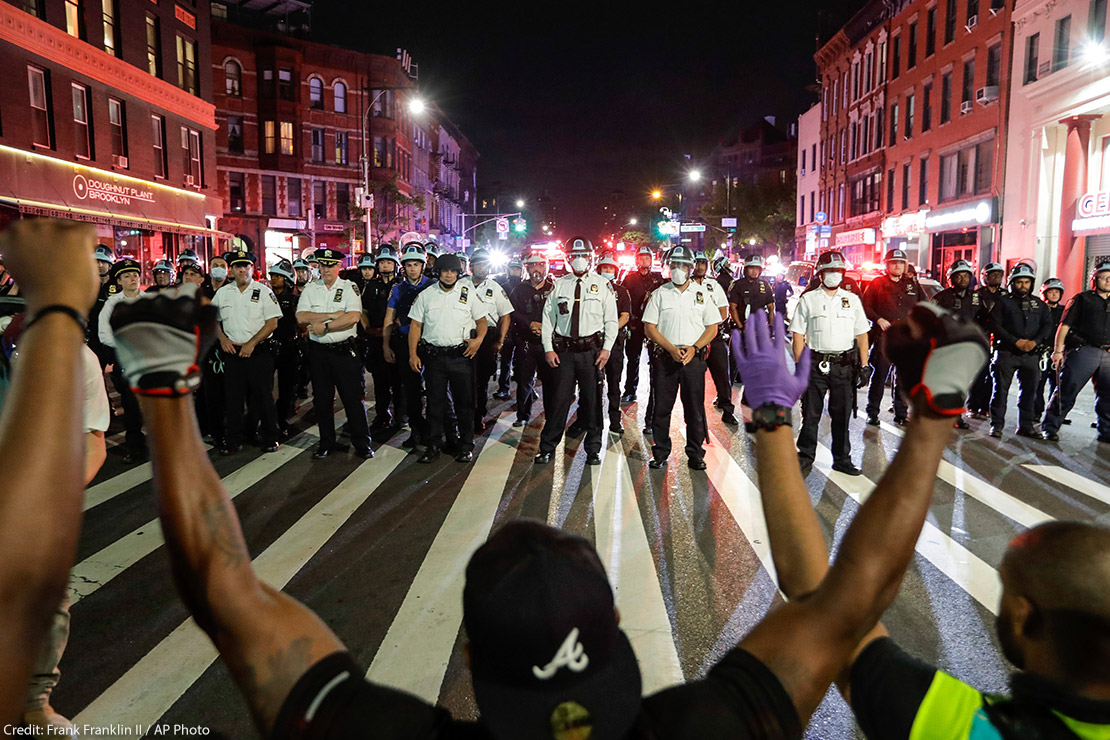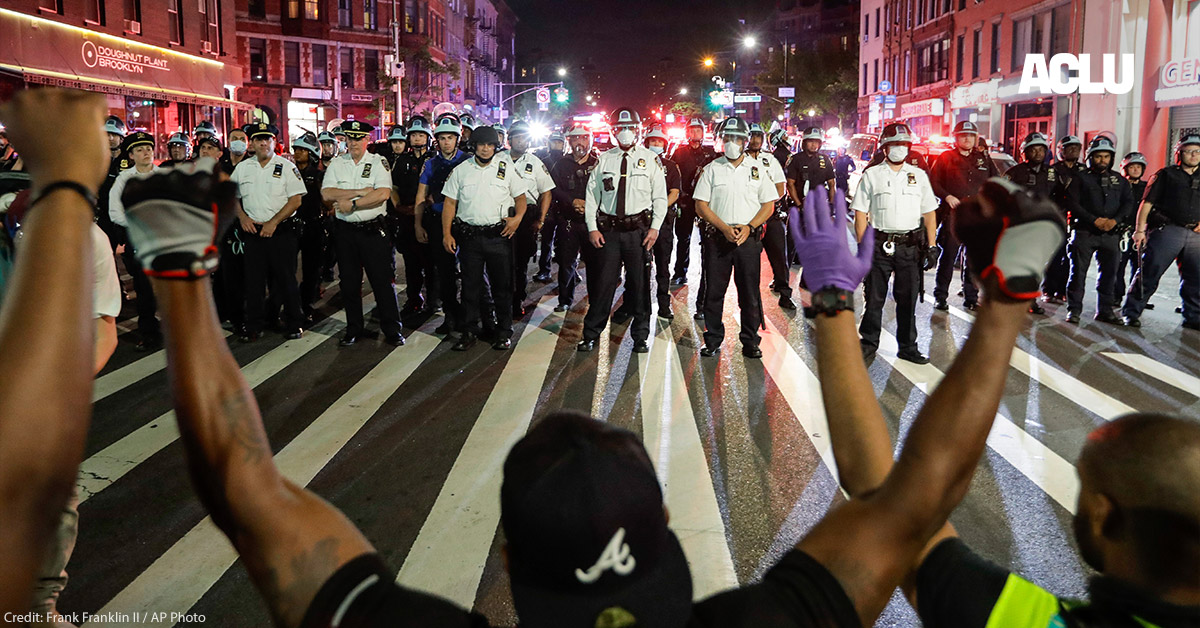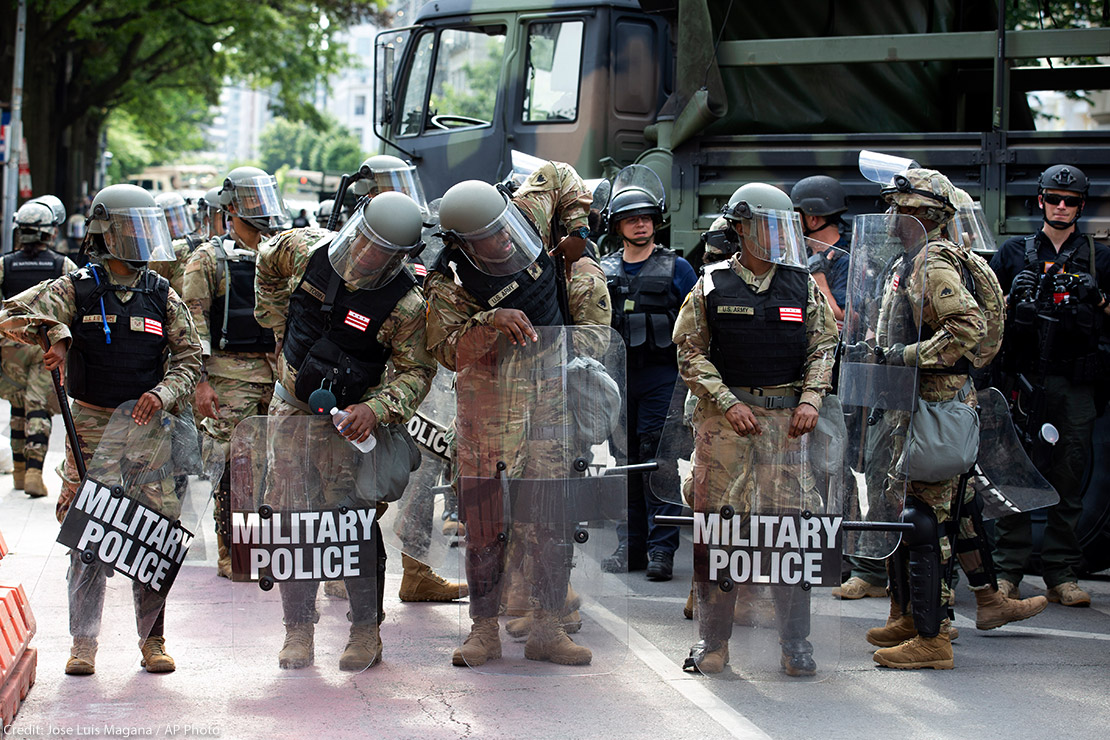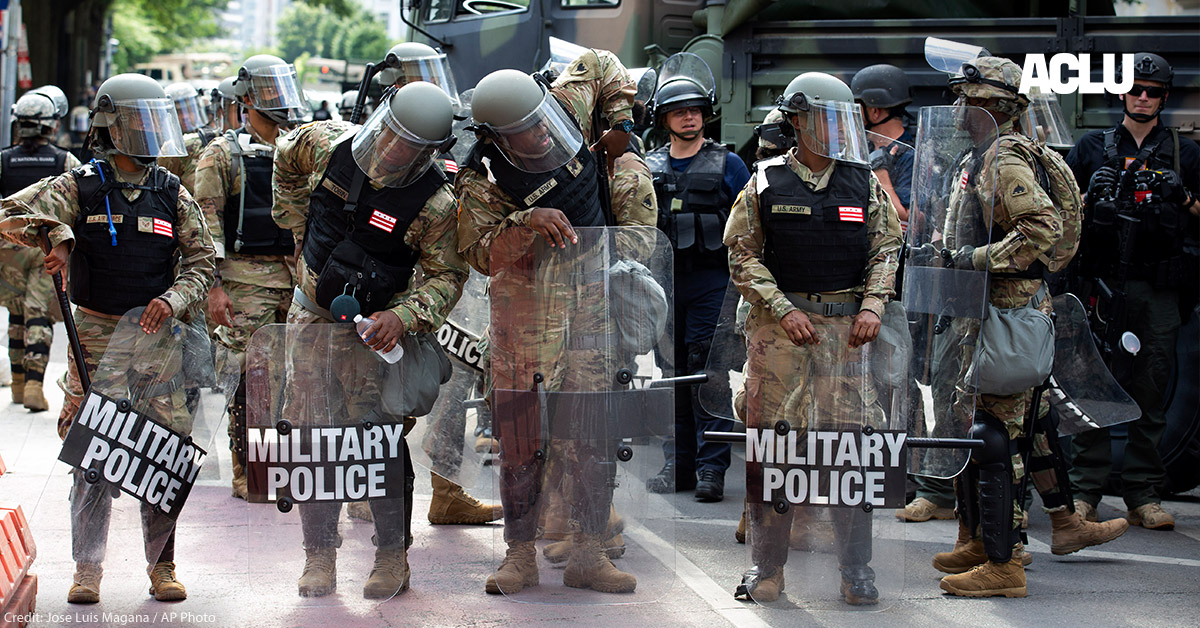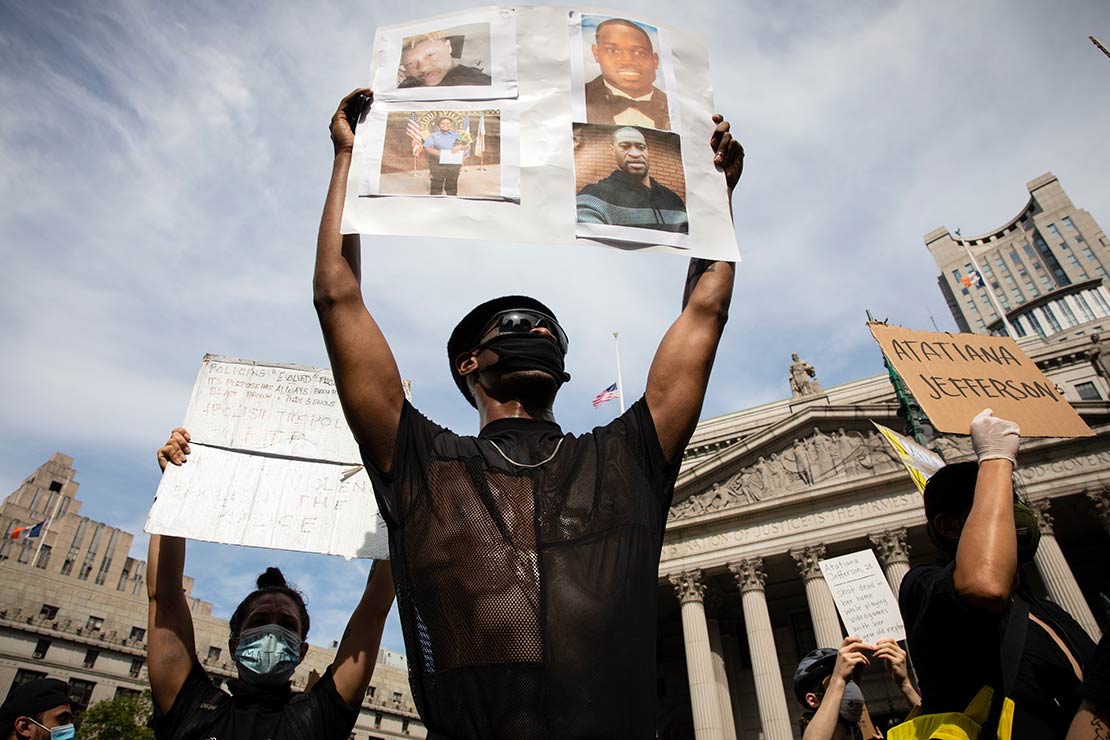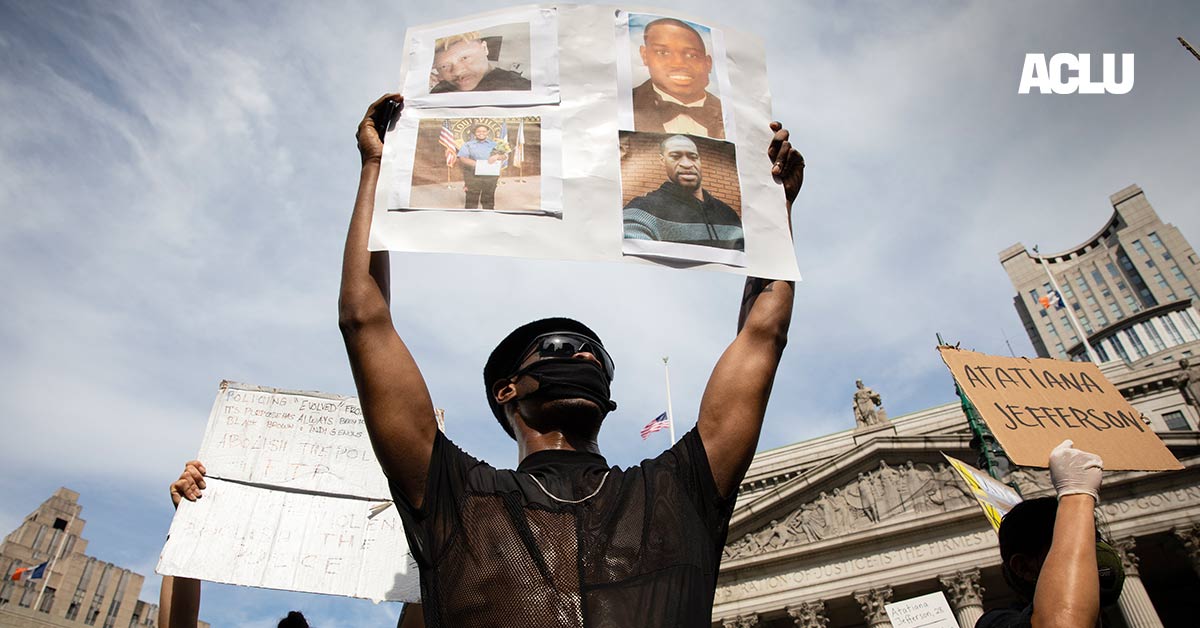Over the last week, ACLU staff across the country have worked as legal observers; educated protesters about their rights; been arrested, tear-gassed and hit with rubber bullets; challenged curfews; organized town halls; talked to victims of police abuse; donated money to Black Lives Matter, local bail funds and other groups; and strategized about transformational change.
The ACLU is busier than ever — let’s not forget this is happening amidst a pandemic and during the Trump administration — but we don’t hesitate to prioritize this work at this time because we have witnessed this reality of police violence all too often.
The ACLU’s advocacy against police violence began in the 1920s, shortly after our founding, and has continued for the next 100 years. In 1931, we spearheaded the issuance of a government report, “Lawlessness in Law Enforcement.” In 1965, in response to the Watts Rebellion, we opened our first storefront office to directly document police abuse. In 1991, following the police beatings of Rodney King, we launched a fight against racial profiling, resulting in litigation and a vibrant nationwide advocacy effort. In 2015, we published “Picking up the Pieces,” a report documenting biased policing in Minneapolis. ACLU reports from New York, Chicago, Newark, Philadelphia, Boston, Detroit, and Nebraska have all documented police departments that reserve their most aggressive enforcement for people of color generally — and Black people in particular.
Despite the tireless work done by so many in the ACLU to address police violence in communities of color, there’s a fundamental truth that we must confront: It has not worked. Black people continue to be murdered and brutalized by police with near impunity. More of the same won’t fix this problem.
As we look to the future, the ACLU unites behind the profound fight that groups like Movement for Black Lives have been leading: the fight for a completely reimagined vision of the role, presence, and responsibilities of police in America.
The fight will be complex, but in practice what we want can be clearly stated: We need to fundamentally change the role of police in our society, and that role has to be smaller, more circumscribed, and less funded with taxpayer dollars. Money saved from reducing the size and scope of police departments must be reinvested into community-based services that are better suited to respond to actual community needs. Doing so will foster improved safety and health outcomes, and present opportunities in Black communities, where decades of underinvestment in everything except police has helped fuel a mass incarceration crisis.
HOW WE GOT HERE
Let’s talk about policing the way we too often don’t. The underlying problem with policing isn’t just the lack of oversight policies, more training, and better procedures. While radically changing these three areas remains essential for harm reduction, the problem itself is more insidious.
The core problem is modern policing itself. The original sin of policing in this nation is its attachment to the nation’s first and most devastating sin: chattel slavery. Modern police forces in this country can be traced back to slave patrols used in Charleston, South Carolina. From their inception, police have been tasked with protecting power and privilege by exerting social control over Black people.
Built upon Jim Crow-era racist constructs, spurious social science, and sprawling legal codes, law enforcement has sought to control Black and Brown people through racialized targeting and the criminalization of Black people generally. Since inception, police in the U.S. have been empowered to act as an occupying force in low-income communities and communities of color across the country, funded by astronomical sums of taxpayer dollars.
Every three seconds a person is arrested in the United States. According to the FBI, of the 10.3 million arrests a year, only 5 percent are for offenses involving violence. All other arrests are for non-violent offenses — these include many relatively minor infractions like money forgery, the alleged crime that the cops who killed George Floyd arrived to investigate; or selling single cigarettes without a tax stamp, the crime Eric Garner lost his life for; or for marijuana or other drug possession.
There is a different world, one in which people need not be arrested for many of these offenses or be otherwise racially targeted and criminalized. We can shrink outsized and misused police power and responsibilities, along with their budgets, and strive to ensure they don’t come into regular, unnecessary contact with community members.
We know this is possible because this different world exists today, for communities that are largely white. The harsh reality is that policing in communities of color looks very different than it does in wealthy, white communities. In those communities, police are often only present when responding to specific serious disruptions to the community, rather than just constantly intruding on people’s everyday lives. To understand the impact of this approach, one only has to look at the approach to policing marijuana — which is used at almost equal rates by Black and white people, though Black people are still arrested at a rate that is almost four times that of white people. Racialized policing is the best way to understand this disparity.
White communities are also more likely to see significant investment in community resources that are purposefully and programmatically used to maintain safety, health, and stability, all without police intervention. The lived reality that white communities already enjoy and take for granted is what we are demanding for communities across the country — an end to over-policing, an end to constant surveillance and harassment, an end to enforcement of non-serious offenses, and an end to the targeting of people of color.
WHAT COMES NEXT
Our Vision for 21st Century policing can be accomplished for a fraction of what we currently spend. Current police budgets are enormous, totaling more than $115 billion per year, collectively. Spending on police and the criminal legal system has dramatically outpaced expenditures in community-based services that help people build stable, safe communities. We have an obligation to change this paradigm and support efforts in Black and Brown communities to develop and build community-controlled institutions and interventions that have been proven to improve public safety and health more effectively than oppressive, terrifying, ineffectual, and deadly modern policing.
There are few instances that warrant the deadly use of force we have witnessed in recent years. Certainly not “knee-to-neck” restraint for an allegedly counterfeit bill. Or a chokehold for selling loose cigarettes. Nor a fatal shooting for jaywalking. Or failing to comply with orders to put your hands above your head.
It’s time to prohibit the use of lethal force unless it is absolutely necessary. The “necessary” standard that was just enacted in California, offers an example that we hope to build off in other states and federally by adding an exhaustion of alternatives requirement.
It’s time to embrace alternatives like civilian-led crisis intervention teams composed of highly trained professionals, including nurses, doctors, psychiatrists, and social workers, to respond to incidents with people who are in mental health crises.
It’s time to put more counselors and more teachers — not police — into our schools.
It’s time to stop criminalizing families experiencing homelessness.
That is the future worth fighting for. The health and wellbeing of our society depends on it, as do the values we have subscribed to as a nation.
Reducing funding to police departments and reinvesting those funds into Black and Brown communities are necessary steps to prevent further harm and to restore the promise of our Constitution for all people.
The ACLU will work to support Black- and Brown-led community organizations to implement a three-part formula to bring an end to our country’s long nightmare with police violence:
- Prohibiting police from enforcing a range of non-serious offenses, including issuing fines and making arrests for non-dangerous behaviors, thus eliminating many of the unnecessary interactions between the police and community members that have led to so much violence and so many deaths;
- Reinvesting savings from the current policing budgets into alternatives to policing that will keep local communities safe and help them thrive;
- Implementing enforceable legal constraints so that there will be only rare instances in which police officers can use force against community members.
These three steps are the most urgent, impactful steps we can take as a country to protect communities from police harm. Together with our partners and allies, the ACLU will help reimagine an effective and far more limited role for police in our country; implement changes that will save lives, advance civil rights and safeguard liberties; and create the conditions to start repairing decades of harm and violence inflicted on overpoliced communities of color.
Anthony D. Romero, ACLU Executive Director
Date
Friday, June 5, 2020 - 11:15amFeatured image
